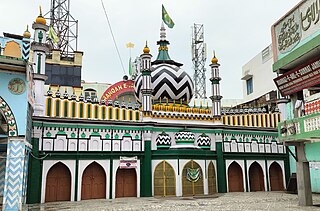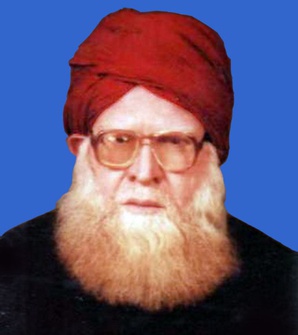Related Research Articles

Sir Syed Ahmad Khan, also spelled Sayyid Ahmad Khan, was an Indian Muslim reformer, philosopher, and educationist in nineteenth-century British India.

The Pakistan Movement was a nationalist and political movement in the first half of the 20th century that aimed for the creation of Pakistan from the Muslim-majority areas of British India. It was connected to the perceived need for self-determination for Muslims under British rule at the time. Muhammad Ali Jinnah, a barrister and politician led this movement after the Lahore Resolution was passed by All-India Muslim League on the 23 March 1940 and Ashraf Ali Thanwi as a religious scholar supported it.

The Barelvi movement, also known as Ahl al-Sunnah wa'l-Jamaah is a Sunni revivalist movement following the Hanafi and Shafi'i schools of jurisprudence, and Maturidi and Ashʿari schools of theology with strong Sufi influences and with hundreds of millions of followers. It is moderate form of Islam that Muslims in south Asia have followed for centuries and it encompasses a variety of Sufi orders, including the Chistis, Qadiris, Soharwardis and Naqshbandis as well as many other orders and sub-orders of Sufism. They consider themselves to be the continuation of Sunni Islamic orthodoxy before the rise of Salafism and Deobandi Movement.

Ahmed Raza Khan Barelvi, known reverentially as Ala Hazrat, was an Indian Islamic scholar, theologian, Mujadid or reviver of Islam jurist, preacher, poet from Bareilly, British India, considered as the founder of the Barelvi movement and the Razvi branch of the Qadri Sufi order.
Ahl-i-Hadith or Ahl-e-Hadith is a Salafi reform movement that emerged in North India in the mid-nineteenth century from the teachings of Sayyid Ahmad Shahid, Syed Nazeer Husain and Nawab Siddiq Hasan Khan. It is an offshoot of the 19th-century Indian Tariqah-i-Muhammadiya movement tied to the 18th-century traditions of Shah Waliullah Dehlawi and the Wahhabi movement. The adherents of the movement described themselves variously as "Muwahideen" and as "Ahl e-Hadith."
Usha Sanyal is an Indian scholar and historian of Islam specializing in the Barelvi movement. She was a visiting assistant professor of history at Wingate University in North Carolina.

Abd al-Qadir al-Jilani was a Hanbali scholar, preacher, and Sufi leader who was the eponym of the Qadiriyya, one of the oldest Sufi orders.

Syed Ahmad Barelvi, also known as Sayyid Ahmad Shahid, (1786–1831) was an Indian Islamic revivalist, scholar, and military commander from Raebareli, a part of the historical United Provinces of Agra and Oudh. He launched the Indian jihad movement that waged a decades-long Islamic revolt against colonial rule across various provinces of British India. Sayyid Ahmad is revered as a major scholarly authority in the Ahl-i Hadith and Deobandi movements. The epithet 'Barelvi' is derived from Raebareli, his place of origin.

Al Jamiatul Ashrafia is a Sunni Madrasa in India. It is located in Mubarakpur in a Northern State of India, Uttar Pradesh.

Madrasa Manzar-e-Islam, also known as Jamia Razvia Manzar-e-Islam, is an Islamic seminary in India. It was founded in 1904 in Bareilly, India by Ahmed Raza Khan Barelvi.

Mustafa Raza Khan Qadri (1892–1981) was an Indian Sunni Muslim scholar and author, and leader of the Sunni Barelvi movement following the death of its founder, his father Ahmed Raza Khan. He was known as Mufti-Azam-i-Hind to his followers. He is widely known as Mufti-e-Azam-e-Hind. On his death date his follower celebrate Urs name as Urs-e-Noori on every 14th Muharram of Islamic Year.

Muhammad Akhtar Raza Khan Azhari, also known as Tajush Shari'ah or Azhari Miya, was an Indian Barelvi Muslim scholar, cleric and mufti. He was the great grandson of Ahmed Raza Khan Barelvi who was considered to be a Mujaddid by his followers and was the founder of the Barelvi movement. He was recognised by Barelvi Muslims as the Grand Mufti of India. He was ranked 22nd on the list of The 500 Most Influential Muslims in the world, compiled by the Royal Islamic Strategic Studies Centre. He had tens of millions of followers in India.

Husamul Haramain or Husam al Harmain Ala Munhir kufr wal mayn 1906, is a treatise written by Ahmad Raza Khan which declared the founders of the Deobandi, Ahle Hadith and Ahmadiyya movements as heretics.

The Grand Mufti of India is the most senior and influential religious authority of the Sunni Muslim Community of India. The incumbent is Sheikh Abubakr Ahmad, general secretary of All India Sunni Jamiyyathul Ulama, who was conferred the title in February 2019 at the Gareeb Nawaz Peace Conference held at Ramlila Maidan, New Delhi, organised by the All India Tanzeem Ulama-e-Islam.

This bibliography of Deobandi Movement is a selected list of generally available scholarly resources related to Deobandi Movement, a revivalist movement within Sunni Islam, adhering to the Hanafi school of law, formed in the late 19th century around the Darul Uloom Deoband in British India, from which the name derives, by Qasim Nanawtawi, Rashid Ahmad Gangohi and several others, after the Indian Rebellion of 1857–58. It is one of the most influential reform movements in modern Islam. Islamic Revival in British India by Barbara D. Metcalf was the first major monograph specifically devoted to the institutional and intellectual history of this movement. Muhammad Tayyib Qasmi wrote a book named The Tradition of the Scholars of Deoband: Maslak Ulama-i-Deoband, a primary source on the contours of Deobandi ideology. In this work, he tried to project Deoband as an ideology of moderation that is a composite of various knowledge traditions in Islam. This list will include Books and theses written on Deobandi Movement and articles published about this movement in various journals, newspapers, encyclopedias, seminars, websites etc. in APA style. Only bibliography related to Deobandi Movement will be included here, for Darul Uloom Deoband, see Bibliography of Darul Uloom Deoband.

The Bibliography of Imam Ahl-e-Sunnat Ahmed Raza Khan Barelvi is a selected list of generally available scholarly resources related to Ahmed Raza Khan Barelvi, the Reviver of Islam in India and founder of Ahl-e-Sunnat Wal Jamaat revival Movement or Barelvi Movement.

Ahmed Riza Khan Barelwi: In the Path of the Prophet is a book written by the Historian and assistant professor of history at Wingate University, Usha Sanyal and published by the OneWorld Publications on 23 May 2005 about the Founder of Barelvi Movement, Imam Ahl-e-Sunnat Ahmed Raza Khan Barelvi. The book deals with all the information about Ahmed Raza Khan Barelvi from his birth to his death.
This Bibliography of Barelvi Movement is a selected list of generally available scholarly resources related to Barelvi movement, a revivalist movement within Sunni Islam, adhering to the Hanafi school of law, started in the late 19th by the Imam Ahmed Raza Khan Barelvi in British India.
Scholars of Faith: South Asian Muslim Women and the Embodiment of Religious Knowledge is a Book written by Usha Sanyal and published by Oxford University Press on 5 July 2020. It cover the ground report of Madarsas belonging to the Barelvi Islam, it focuses on Female education. Muslim Girls' Education in North India in the Twentieth Century and Beyond, Jamia Nur al Shariat Madrasa, Shahjahanpur which is for Women and Al-Huda Institute, a Non-governmental organisation providing online courses of Quran and Hadith.
References
- ↑ Ingram, Brannon D. (2018-11-20). Revival from Below: The Deoband Movement and Global Islam. Univ of California Press. ISBN 978-0-520-97013-7.
- ↑ Naim, C. M. (February 2002). "Devotional Islam and Politics in British India: Ahmad Riza Khan Barelwi and His Movement, 1870-1920 . Usha Sanyal". History of Religions. 41 (3): 297–298. doi:10.1086/463688. ISSN 0018-2710.
- ↑ Rahman, M. Raisur. "Review of Usha Sanyal, Devotional Islam and Politics in British India: Ahmad Riza Khan Barelwi and His Movement, 1870-1920 (Yoda Press, 2010)".
{{cite journal}}: Cite journal requires|journal=(help) - ↑ Manian, Padma (January 2000). "Devotional Islam and Politics in British India: Ahmad Riza Khan Barelwi and His Movement, 1870–1920: Sanyal, Usha: New Delhi: Oxford University Press, 365 pp., Publication Date: August 1999". History: Reviews of New Books. 28 (2): 85. doi:10.1080/03612759.2000.10525430. ISSN 0361-2759. S2CID 143835992.
- ↑ Gilmartin, David (November 1997). "Devotional Islam and Politics in British India: Ahmad Riza Khan Barelwi and His Movement, 1870–1920. By Usha Sanyal. Delhi: Oxford University Press, 1996. xxi, 365 pp. $35.00 (cloth)". The Journal of Asian Studies. 56 (4): 1142–1143. doi:10.2307/2658359. ISSN 1752-0401. JSTOR 2658359. S2CID 153938856.
- ↑ Sanyal, Usha (1996). Devotional Islam and politics in British India: Ahmed Riza Kḥan Barelwi and his movement, 1870 - 1920. Oxford University Press. ISBN 978-0-19-563699-4.
- ↑ Ansari, Sarah (1998-11-01). "Devotional Islam and Politics in British India. Ahmad Riza Khan Barelwi and his Movement, 1870-1920". The English Historical Review. 113 (454): 1352–1353.